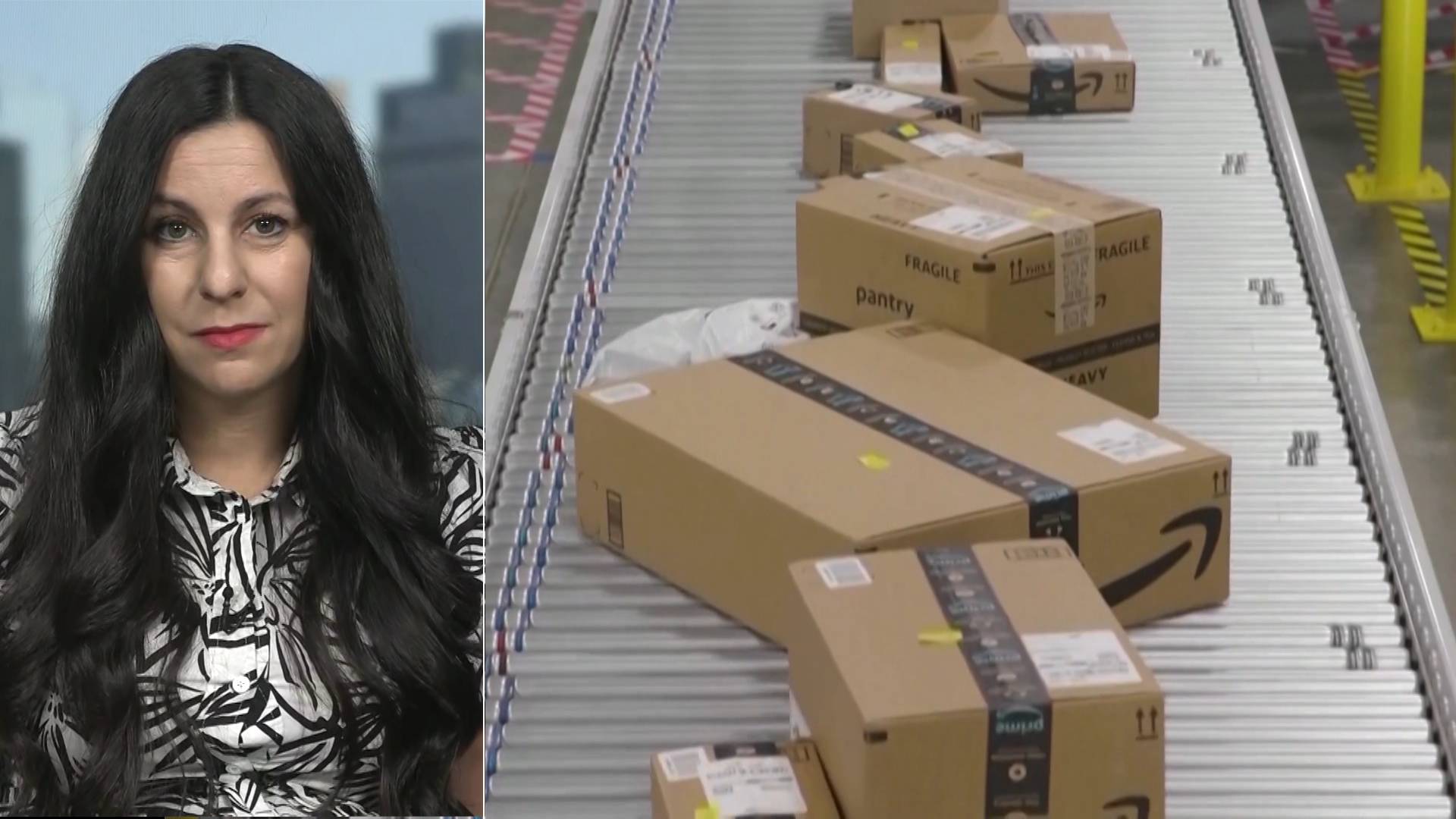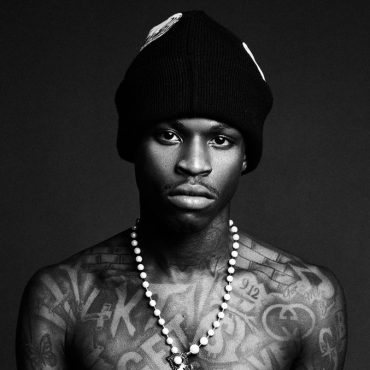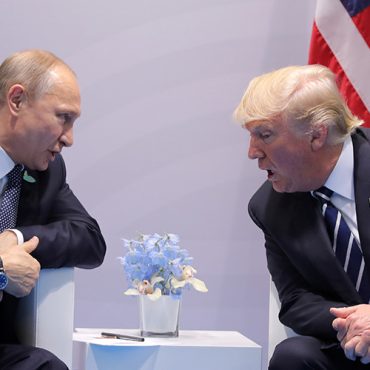This is a rush transcript. Copy may not be in its final form.
AMY GOODMAN: Teamsters President Sean O’Brien asked both conventions if he could address them. The Republican National Convention said yes. This is what Sean O’Brien had to say.
SEAN O’BRIEN: And here’s another fact: Against gigantic multinational corporations, an individual worker has zero power. It’s only when Americans band together in democratic unions that we win real improvements on wages, benefits and working conditions. Companies like Amazon are bigger than most national economies.
AMY GOODMAN: So, that’s Sean O’Brien, the president of the Teamsters. Dana Mattioli, you are the author of the new book The Everything War: Amazon’s Ruthless Quest to Own the World and Remake Corporate Power. Talk about what Sean O’Brien was talking about. And talk about Amazon, when it comes to the Republicans, when it comes to the Democrats, when it comes to its power in the world.
DANA MATTIOLI: I mean, Sean O’Brien is right. Amazon’s sales are bigger than the GDPs of many nations. And my book chronicles its rise from unlikely successful garage startup to the most dominant force in American business history, almost like the equivalent of a modern-day Standard Oil, and the tactics it uses, illegal or unethical or anti-competitive, to put its finger on the scale and dominate industry after industry, and the effects that has on our economy, job creation, or, you know, losing jobs, bankruptcies and innovation.
And, you know, Amazon has had a really bumpy history with both the Republicans, specifically Donald Trump, and also the Democrats. You know, Biden has been really tough on Amazon. He put in place Lina Khan, the head of the Federal Trade Commission, the agency overseeing them. And she brought forward this historic monopoly lawsuit against the company last year. So, they’ve had this scorched-earth approach to government relations and public relations that has made enemies on both sides of the aisle.
AMY GOODMAN: And why did you decide to write an entire book on Amazon?
DANA MATTIOLI: Yeah, I was The Wall Street Journal’s mergers and acquisitions reporter. And in that role, I noticed, over six years, CEOs of the retail companies, in the beginning, were nervous about Amazon. By the time I left the M&A job after six years, every CEO that I spoke to was nervous about Amazon — the industrial CEOs, the healthcare companies, the logistics companies. It was being invoked in every boardroom in corporate America as a source of fear. People thought it was going to eat their lunch and take their business.
And I wanted to get to the bottom of how they penetrated industry after industry and became the top player, top one, two or three player, in like 12 different industries. And I set about investigating the company, and I found just a ton of business practices driven by this toxic culture at Amazon, where the company lied, spied, cheated its way to the top. And I thought this book would be the perfect medium to bring light to those tactics, to show consumers, Americans, people around the world, why Amazon always seems to win. And oftentimes it’s because it has its fingers on the scale.
AMY GOODMAN: And I want to talk about something that’s been a controversy, someone who has become a controversy now with the Democrats. I want to ask you about the current Federal Trade Commission Chair Lina Khan, who you write about in your book on Amazon. Last year, the Federal Trade Commission and 17 states sued Amazon, saying it had illegally stifled competition. In May, Khan was asked about Amazon in an interview on ABC’s This Week with Jonathan Karl.
JONATHAN KARL: You obviously made your name talking about the threat of Amazon as, effectively, a monopoly power. In what way is Amazon a monopoly? Because I can buy on Amazon, but I can also go down the street, and I can buy at Walmart, or I can buy at Target. I mean, how is Amazon a monopoly?
LINA KHAN: A few ways that we can tell that it’s a monopoly is because it, too, is acting in ways that involve mistreating its customers. We’ve seen that —
JONATHAN KARL: How so?
LINA KHAN: The fees that it charges small businesses have dramatically increased over the last few years, so that now some small businesses have to pay one out of every two dollars to Amazon. It’s basically a 50% Amazon tax. Our lawsuit also alleges that Amazon has been using a whole set of secret algorithms to quietly raise prices for consumers. And so, we allege that they’ve been able to get away with doing this through a whole set of illegal tactics that make it difficult for rival e-commerce websites to really stand up and enter the market and compete.
AMY GOODMAN: So, that was Federal Trade Commission Chair Lina Khan. Dana, your book opens with what one of your sources calls “the most important law review article written in our lifetimes.” That was a reference to an article Lina Khan wrote in 2017 headlined “Amazon’s Antitrust Paradox,” which was published in The Yale Law Journal. Lina Khan argued Amazon is a monopoly that had, quote, “evaded government scrutiny.”
Two major Democratic donors, media mogul Barry Diller and LinkedIn co-founder Reid Hoffman, have publicly called for Kamala Harris to fire FTC Chair Lina Khan, who has led Biden’s antitrust efforts — that’s if Kamela Harris becomes president. Hoffman sits on the board of Microsoft, which was sued by the FTC. Hoffman was recently interviewed by CNN’s Jake Tapper.
JAKE TAPPER: Thanks for joining us. So, you and other big money donors are giving money to Vice President Harris, suggesting also that she replace the head of the FTC, which impacts policy and the economy. What do you say to somebody who watches this and says, “This isn’t how American politics should work, rich people getting to buy levels of influence”?
REID HOFFMAN: Well, I totally agree with not buying levels of influence. I separate my role as a donor and expert. So, if you asked me as a donor, I say I’m giving money to Kamala Harris because I think she’s the best future president for the U.S., for business, for a bunch of other things. If you ask me as an expert about what, you know, kind of Lina Khan is doing and whether I think she is helping or hurting America relative to your anti-merger policies, which are, you know, mostly to bring litigation, versus, you know, really solidly grounded in kind of what’s going on and what helps American business thrive here and overseas, then I give an expert opinion. But I think donor and expert should be kept separate, and I’ve never tied the two ever, in any conversation anywhere I’ve ever had.
AMY GOODMAN: So, that’s billionaire donor Reid Hoffman, who has given $10 million to have Kamala Harris elected president. Your response, and the significance of what’s the pressure that’s being brought right now around getting Lina Khan fired, Dana Mattioli?
DANA MATTIOLI: Yeah, Lina Khan has become this lightning rod in CEO circles, but specifically in tech circles. We’ve seen CEOs and VCs become very frustrated with the FTC under Lina Khan, because she’s been very critical of them. She’s taken a very close look at their companies. They’ve brought lawsuits against all Big Four tech companies, between the DOJ and the FTC, as well as other companies. So it’s not surprising. But Biden has been a staunch advocate of hers.
The big question mark is what Kamala does, if she were to become the president. Interestingly enough, this is another area where there’s been some confluence. JD Vance is a big Lina Khan fan, as is Matt Gaetz. So, there are some really rightward-leaning Republicans that are her fans. They call themselves the “Khanservatives.” So, this is a very big question mark for whatever administration takes over as to the fate of Lina Khan and what that means for regulation at the antitrust levels.
AMY GOODMAN: And where do you see — what do you see is the fate of Amazon? I mean, there was just a massive Google lawsuit finding it is monopolistic. What about Amazon?
DANA MATTIOLI: I would say that Google lawsuit from the DOJ, where the Department of Justice, you know, they won their case, that bodes really well for Amazon, which is being sued by the FTC. It won’t go to court ’til 2026, so there’s a lot of time in between now and then to see what would happen. But if Lina Khan and the FTC wins that case, it could have lasting effects for the company. It could mean a breakup, in some ways, of how Amazon works and whether, you know, its retail business is tied to its logistics arm or other areas that could be pared off. So, this is something that could be really historic, depending on which way the dice roll.
AMY GOODMAN: And when you say it bodes really well for Amazon, you mean for the breakup of Amazon?
DANA MATTIOLI: Well, it bodes really well for the FTC’s case, I would say.
AMY GOODMAN: Well, I want to thank you very much, Dana Mattioli, for joining us, author of the new book, The Everything War: Amazon’s Ruthless Quest to Own the World and Remake Corporate Power. Dana is a senior reporter at The Wall Street Journal. We’ll link to your article, “Inside Elon Musk’s Hands-On Push to Win 800,000 Voters for Trump.”
Coming up, the prominent Bethlehem Palestinian pastor, the Reverend Munther Isaac, joins us here in our New York studio. He’ll be giving a major address tonight at the historic Riverside Church. Stay with us.











Post comments (0)